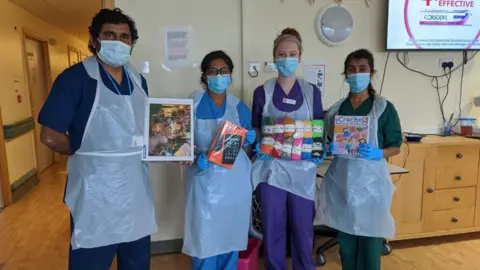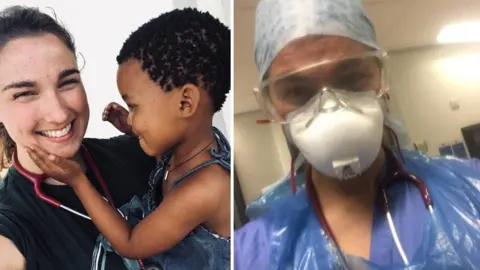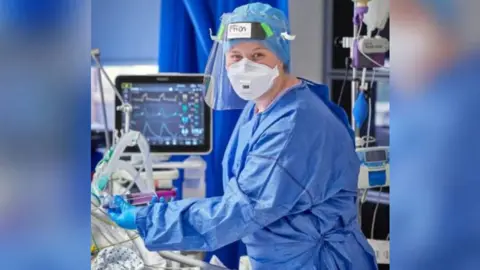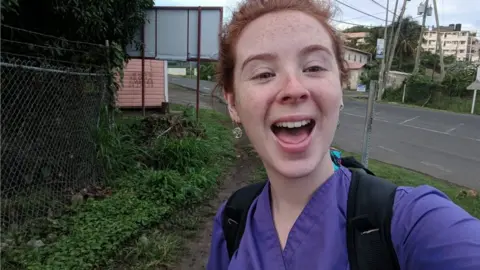Coronavirus: Students' stories of working on NHS front line
 Jodie Gornalls
Jodie GornallsFor many young people in Wales the spring and summer of 2020 will be remembered as a time of missed opportunities - or worse.
Lockdown and its aftermath caused studies to be paused and travel plans to be shelved, while others lost jobs or had to put their careers on hold.
But 130 medical students and about 3,000 healthcare students were fast-tracked to respond to the coronavirus crisis.
Three of them from Cardiff University spoke to BBC Wales about what that was like.
 Eli Wyatt
Eli Wyatt The junior doctor
Medical student Eli Wyatt was volunteering in Namibia as part of her studies when lockdown started. The 23-year-old had been working with rural communities, helping those with HIV, TB and malnourished children.
She managed to get on one of the last flights home before everything shut down.
Eli was given the choice to pause her studies but she volunteered to start helping out instead.
"My family home was flooded twice in the space of four months and so since October last year we've been living in caravans in the garden. So actually, there wasn't a huge amount of space for me at home anyway. It just made sense," she said.
"I don't think I could have sat by and watched."
Eli was placed at Glan Clwyd Hospital in Bodelwyddan, Denbighshire, and ended up on Ward 11: the respiratory ward.
She watched nervously as the number of Covid-19 cases rose in south Wales and eventually the top floor of the hospital where she worked filled with patients too.
While the camaraderie in the team kept her going over the next few weeks, she says there were some dark days too.
"We lost patients unexpectedly. We'd send patients home and then they'd come back in for whatever reason, so there were definitely a couple of tricky days," she said.
"Some tears, yeah, especially when we've had a few family members in tears as well, that's always really difficult."
But Eli has no regrets: "I think it was a privilege, personally, to be able to get involved."
 Nick Mason
Nick MasonThe nurse
Student nurse Ffion Wilkins was placed in the critical care unit in one of the worst affected areas of the UK outside London.
The Royal Gwent Hospital in Newport was the centre of the virus outbreak in Wales and 22-year-old Ffion was at its coalface, dealing with patients who needed intensive round-the-clock care.
"When I started it was very much up in the air. There was a lot of uncertainty and I often was really scared and nervous and tearful. It was a really emotional time," she said.
"But I have experienced looking after patients with other sorts of transmittable infections and I've had experience wearing PPE before. So I just had to calm myself down and just say 'you can do this'.
"I think it was really fear of the unknown because then as soon as I just got stuck in I felt confident and I was fine and everyone was lovely, saying how much of a difference I was making."
She recalls seeing patient after patient rolled on their front - a sign that doctors were running out of treatment options.
"I remember walking in one day and there's a row, I think it must be about five beds or six beds, and every single patient was proned, which means they were placed on their stomach.
"That's not a good sign really, it means that they're really poorly and you're trying everything: drugs, you're looking after them, and proning is like one of the final things you can do to help someone get better."
Ffion spent a couple of weeks away from her parents living on-site, which she found really tough, but said she had plenty of support from her colleagues and lecturers. Despite the pandemic, she managed to qualify with a first.
"I've learned so much, it's been a life-changing experience and it's put so many things into perspective. If I could give myself any sort of advice about the decision to opt in, I would just tell myself that you're you are capable. It's going to be a hard couple of months, but it is going to be worthwhile and rewarding."
 Jodie Gornall
Jodie Gornall The mental health nurse
Jodie Gornall had been studying nursing at Cardiff but was home in Manchester for the Easter break when she got the email.
"My plans for the holiday was really just to revise and just chill out and try and unwind. Then lockdown was announced."
On her return to Cardiff, Jodie was placed on a Covid-19 recovery ward for people with mental health problems.
"We had admissions from people where they had no history of psychiatric problems, no history of mental health problems, but they were coming in and being admitted because of social isolation, because of shielding.
"These were all people who were usually quite active in the community, who would go to clubs or into their community.
"We would have people admitted with acute stress and depression - psychosis even - where these people would never have experienced this sort of mental ill health if it weren't for the lockdown."
Jodie says she got through those gruelling 13 weeks with the support of her family and her boyfriend. Like Ffion and Eli she feels the experience has changed her and taught her a lot, giving her more confidence to step into her chosen career.
Jodie is due to return to her studies after the summer break - but she says if there's a second wave she won't hesitate to put everything aside and step back into her scrubs.
